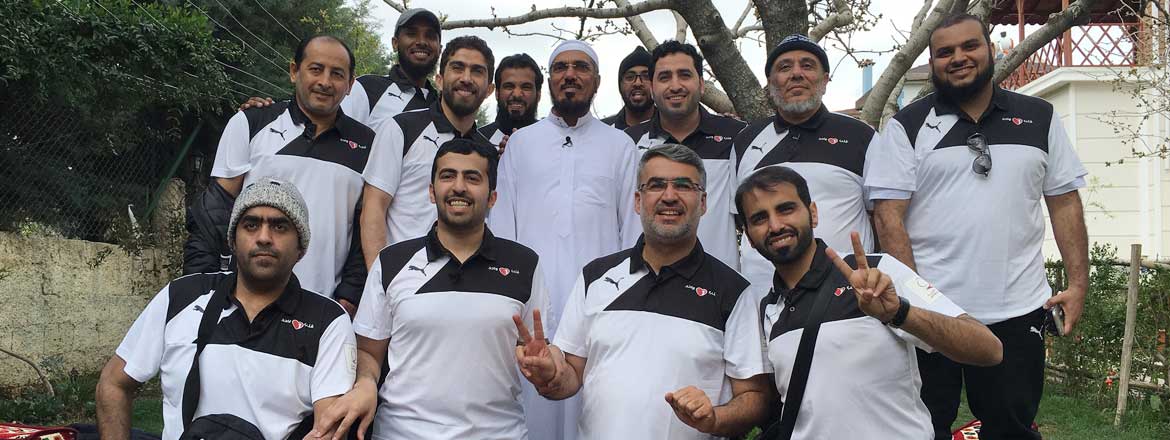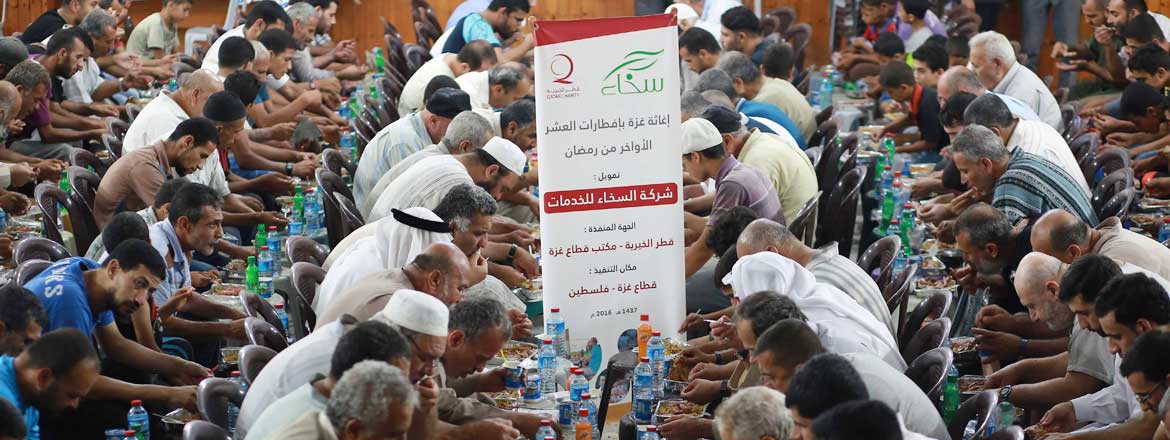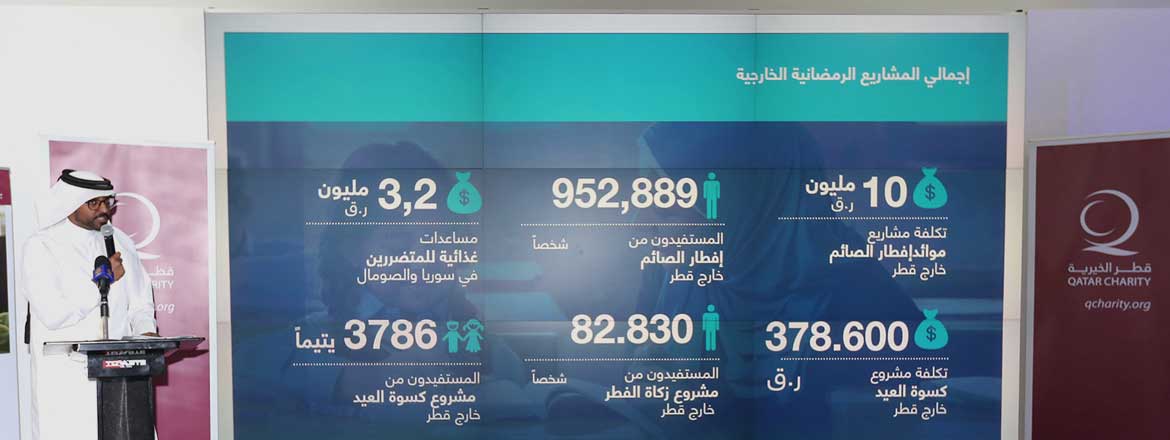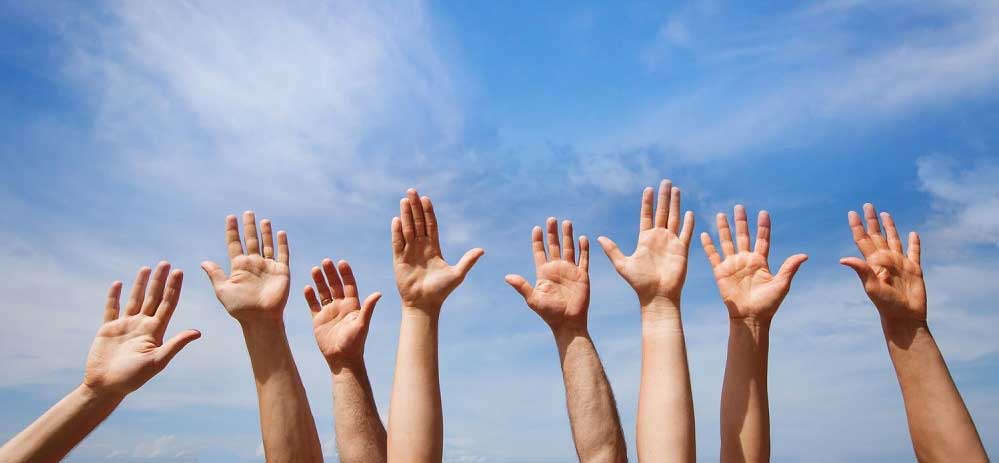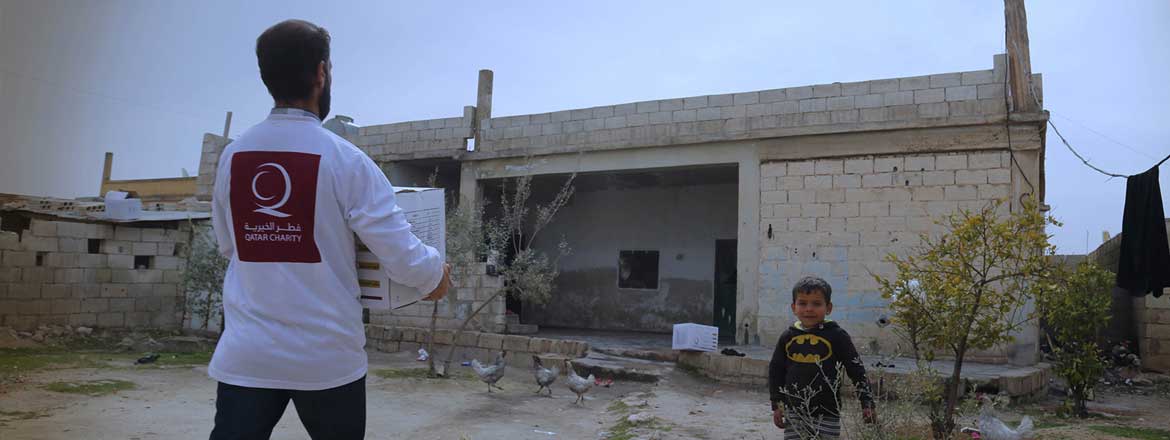Ramadan and Islam
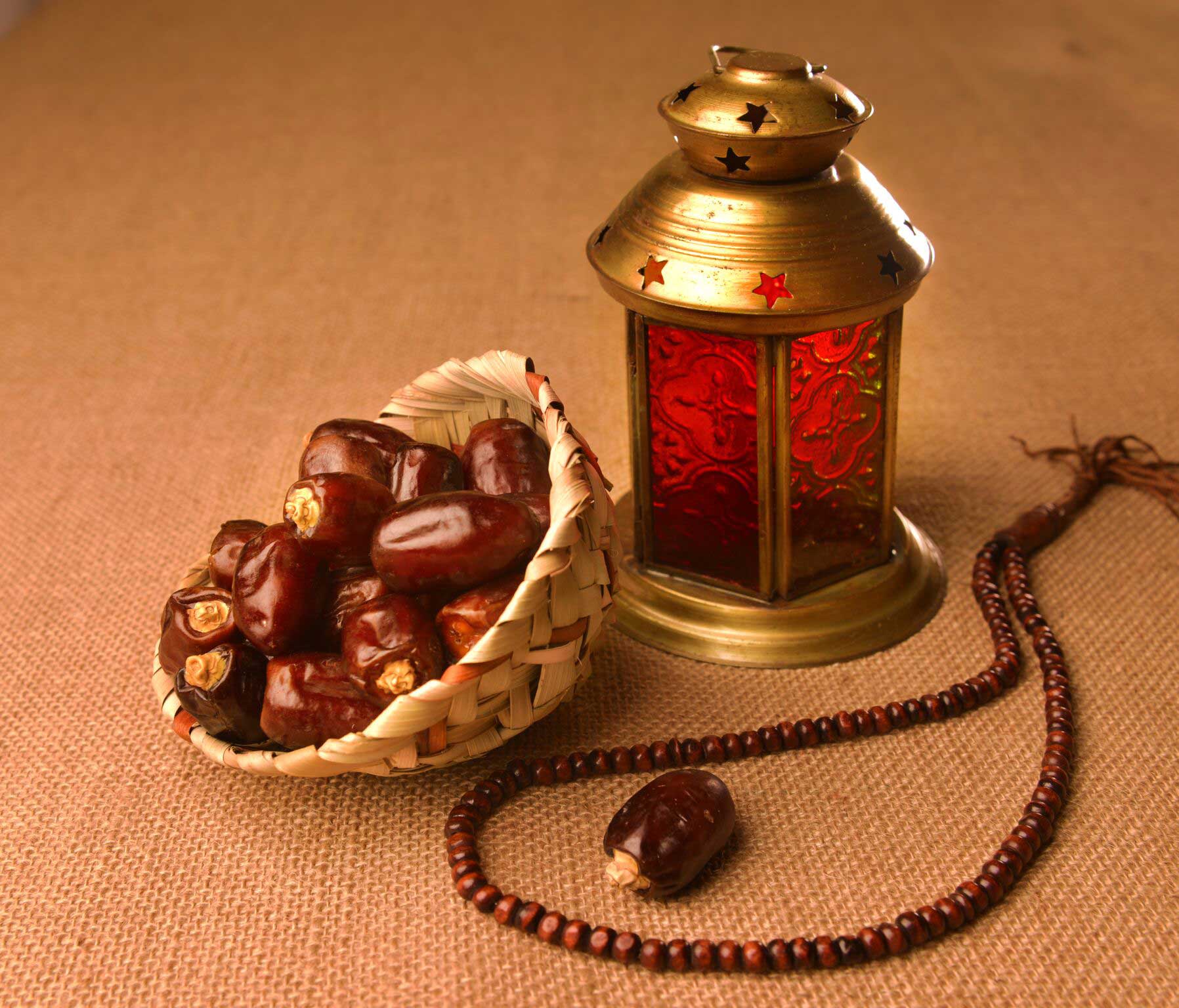
2017-05-30T11:41:23+01:00

By: Afaf Ali
Ramadan is the ninth month of the Islamic lunar calendar. Every day during this month, Muslims around the world spend the daylight hours in a complete fast. The word "Ramadan" comes from the Arabic root word for "parched thirst" and "sun-baked ground." It is expressive of the hunger and thirst felt by those who spend the month in fasting. Fasting is another unique moral and spiritual characteristic of Islam.
During the Blessed month of Ramadan, Muslims all over the world abstain from all food, drink, and other physical needs during the daylight hours. Ramadan is much more than just not eating and drinking; it is a time to purify the soul, refocus attention on God, and practice self-discipline and sacrifice. Through increased devotion, Muslims feel closer to their Creator and recognize that everything we have in this life is a blessing from Him.
Fasting is considered one of the five Pillars of Islam; five activities that shape a Muslim's life. Prayer occurs on a daily basis; pilgrimage is done once in a lifetime; charity and professing one's faith are both ongoing. It is an annual observance; every year, Muslims take an entire month out of their lives to observe this strict fast and rededicate themselves to worship and faith.
Muslims are called upon to use this month to re-evaluate their lives in light of Islamic guidance. We are to make peace with those who have wronged us, strengthen ties with family and friends, do away with bad habits essentially to clean up our lives, our thoughts, and our feelings. Through self-control, a Muslim practices good manners, good speech, and good habits.
Muslims feel the physical effects of the fast as a reminder of those who suffer throughout the year, those who are poor, homeless, refugees, and who cannot meet their basic needs. It reminds Muslims not to be wasteful and to feel empathy for those who face hunger on a daily basis. We should feel gratitude for the bounties of Allah: clean water, sufficient healthy food, the comfort of a home, health of our family members. There are so many in the world who must survive without these basic needs, and Ramadan is a time for us to give thanks and reaffirm our commitment to helping those in need.
During Ramadan, every part of our bodies must be restrained. The tongue must be restrained from backbiting and gossip. The eyes must restrain themselves from looking at unlawful things. The hand must give in charity, and not touch or take anything that does not belong to it. The ears must refrain from listening to idle talk or obscene words. The feet must refrain from going to sinful places. In such a way, every part of the body observes the fast.
Therefore, fasting is not merely physical but is rather the total commitment of the person's body and soul to the spirit of the fast. Ramadan is a time to practice self-restraint; a time to cleanse the body and soul from impurities and re-focus one's self on the worship of God and charity to mankind.
Note: The article expresses the opinion of the author solely and does not necessarily reflect the viewpoint of Qatar Charity.
Related News
QC Prepares for the Launch of
QC finished filming the third edition of its reality TV show 'One Heart' near the Turkey-Syria borders. Several famous people were in the show such as Dr. Salman Al Ouda and a group of media, dawa and sports stars from Qatar, the Gulf and the Arab World. The show will be displayed during the coming Ramadan 1437 AH.
"One Heart" TV show aims at introducing the humanitarian issues to the public, and attracting support in a spiritual and exciting manner. It will include lots of adventures and surprises. It also presents solutions in a creative way.
Awen Initiative
This year, the program focused on the sufferings of the Syrian refugees, considering their issue the greatest of all disasters around the world. The members visited the refugees' camps near the Turkey-Syria borders in multiple areas of Ghazi, Gaziantep, Antakya, Kilis and others. In cooperation and coordination with the regional partners of QC there, the teams paid multiple visits to QC's projects in Turkey which target this group of people.
The program also sought to show Turkey's huge role, as a country and people, in taking care of and sheltering the Syrian refugees. Turkey offered them relief aids, medications and free education. It also established camps for them. Turkey is considered the country with the biggest number of Syrian refugees; i.e. an average of more than 3,000,000 refugees found across the different Turkish cities and territories.
During the show, Dr. Al Ouda and the participants spoke about Awen Initiative for the Empowerment and Development of Syrian Refugees which was recently released by QC. They clarified the different aspects of this initiative; especially relating to improving charity work and moving it from relief aids stage to become sustainable development. It aims at improving the Syrians' capabilities and training them so as to work and become financially independent. This way, a healthy society would be built, clear of any social diseases which had broken many societies apart.
The activities which showed the great efforts of the participating teams were related to displaying the success stories of the Syrian refugees in Turkey. Some of them became merchants, others became employees; some others worked in agriculture, raising cattle and other arts and crafts.
The Three Teams
In addition to Sheikh Salman Ouda, the number of participants reached around 15 figures divided into 3 teams. The first is: 'Al Karama (White) Team' and consists of Uqeil Jinahi, a Journalist; Firas AlKhatib, International Football Player; Mohammed Abbas, Munshid; Mohammed Al Barak, Quran Reciter; and Siwar Al Thahab, Sports Commentator.
The second team is 'Al Nakhwa (Green) Team': Sheikh Khaled Abu Mooza, a Journalist, Preacher and a Businessman; Yehya Hawa, a Munshid; Ali Al Ghatayen, a Poet; Nasser Al Weiber, a Poet; and Mohammed Sa'don Al Kuwairi, QC's Ambassador and a Journalist.
The third team is 'Al Himma (Blue) Team': Nasser Al Khalifi, a Journalist; Ibrahim Al Naqib, a Munshid; Sabbah Al Kuwairi, a Journalist; Nayef Al Sharhan, a Munshid; and Adel Lami, an International Football Player.
The Earlier Seasons
"One Heart 3" is distinguished with the variety of activities it presents. The 3 teams met with orphans, people with disabilities, widows, elderly and tens of other humanitarian cases. They were interested in educational, health, shelter, economic empowerment, social care and income-generating projects implemented specially for the refugees.
Through the show, invitations will be sent for participation and donations through QC's channels such as its hotline, text messages, websites and QC's bank account which will be later on announced (after receiving the necessary licenses).
The second season of One Heart was filmed in Sudan; while the first was filmed in Socotra the year before that.
Qatar Charity extends thanks t
- Al-Kuwari, "We extend our thanks to the campaign projects' Qatari supporters and sponsors contributing to charities and good deeds."
Qatar Charity extended its thanks and appreciation to the national institutions and companies that supported the Ramadan campaign 1437 AH "Your Giving Saves Lives." QC pointed out that the campaign supported the needy families, alleviated the population's intense suffering, and helped millions of people inside and outside the country in Ramadan.
"Believing in the importance of partnership and cooperation in realizing the development and humanitarian objectives and giving the opportunity for more charitable work, QC spares no effort to enhance its cooperation with various partners nationally, regionally and globally, as this is aligned to the State of Qatar's vision", said Mr. Yousef bin Ahmed Al-Kuwari, the CEO of QC.
Relief and Development
He added that we should be faithful to our partners in Qatar and appreciate their efforts that deeply had a positive impact on the beneficiaries and pleased the displaced, refugees, needy, orphans and patients. He also prayed for Allah to double the reward of the benevolent people.
Al-Kuwari encouraged the benevolent Qataris and residents to continue donation for QC's development and relief projects inside and outside Qatar.
The CEO of QC asserted that Qatar Charity's role is not limited to financing the projects that are being implemented and bringing the charity resources cooperating with the public sector, the private sector and the third sector in the field of social responsibility, but it is extended to education and training.
Government Agencies
The partnerships relating to QC's Ramadan campaign 1437 AH "Your Giving Saves Lives" included the public sector, semi-governmental sector, the private and the non-profit sector. The partnerships' modalities, frameworks and outcomes included providing discounts and direct services to the beneficiaries and supporting the direct social impact projects. They also included giving the opportunity to the cooperating agencies' staff to provide the in-kind donations through the intensive campaigns conducted for the needy, providing halls and providing the infrastructure services from these agencies to QC for free. This would make it easier for these agencies to implement their programs and adopt the local moral, recreational, cultural, social and awareness-raising projects.
Regarding the governmental and semi-governmental sector, QC built partnerships with many agencies to implement charity projects during the holy month of Ramadan and received in-kind, and cash donations. These agencies included:
The Ministry of Awqaf and Islamic Affairs, Dawa Administration, Sheikh Abdullah Bin Zaid Al Mahmoud Center, the Ministry of Economy and Commerce, Qatargas, RasGas, Hamad Medical Corporation, the Public Works Authority " "Ashghal", Qatar Railways "Rail", Qatar Airways, Cultural District " Katara", Water and Energy Usage Rationalization Administration - Kahramaa, Qatar Tourism Authority, Hamad international Airport, Al-Wakrah Municipality, Umm Salal municipality, Ministry of transport and communications, the Ministry of Education, the Municipality of Doha, the Ministry of Health, the Ministry of energy and Industry, Lekhwiya, the Ministry of Municipality and Environment, the Ministry of Interior, and the Qatar Financial Markets Authority.
Commercial and Media Organizations
QC has cooperated with a number of companies, commercial institutions, banks, private centers and schools inside the state such as: Sheikh Abdullah AL-Ansari Complex for the Holy Quran, Al Meera Consumer Goods Co., Quality Group, Safari Group, Ansar Gallery, ALI BIN ALI WATCHES & JEWELLERY , Landmark, Villaggio Mall, Aqua Park Qatar, Turkish Airlines, the United Restaurants and Hospitality Group, HSBC Bank, the Grand Hyatt Hotel, Qatar Volunteers Group "ONE DOHA", Qatar Cancer Society, The Pearl-Qatar- the United Development Company (UDC), Tomorrow's Pioneers Center, Gulf Mall Complex, Moevenpick Hotel , "Ooredoo", Vodafone, Mwasalat , Qatar Islamic Bank-Zakat Committee, Barwa Bank Group, Al Rayan Bank, Sulaiman Al Haider Company, Doha Bank, Al-montazah Model Independent School, Ahl Alkaram, Almaraya Company, Inchcape Shipping Services, Landmark Group, Barahat AlWakra, Unilever, Marks & Spencer Villagio and Landmark (branches), and the Youth Company (volunteers).)
In the field of media support, partnerships were built with Alsharq newspaper, Al-Raya newspaper, Al-Watan newspaper, Al-Rayyan Television Channel, Qatar TV, Al-Jazeera Media Network, Al Quran Al Kareem Radio, Qatar Foundation Radio and Sawt Al-Khaleej Radio
Campaign Programs
QC has launched its Ramadan campaign for this season under the slogan "Your Giving Saves Lives ". The total cost of the projects implemented during the holy month of Ramadan 1437 AH inside and outside Qatar exceeded QR 32.2 million, with more than 2,131,000 people expected to benefit from the campaign.
The QC campaign aims to reach 180.000 fasting people with the provision of Iftar at 24 collective tables at a total cost of about QR 9 million. The Iftar tables has reached new groups such as factory workers, farms workers, home to home Iftar, mobile Iftar, giving water to worshipers, Ramadan supplies and supporting Iftar tables for communities.
Qatar Charity’s Ramadan Campai
Executive Director of Local Development assured, “More than 2 million people will benefit from our ramadan projects in 1438H, at a cost of about QR 31 million.”
Qatar Charity (QC) has launched its campaign for this year’s Ramadan season entitled “Give and Shine Through”. The estimated total cost for projects to be implemented inside and outside Qatar, during the Holy Month of Ramadan 1438H, is QR 31 million, and the number of beneficiaries is expected to reach over 2 million people.
QC held a press conference at Al Jazeera Cafe in the cultural district of Katara to announce launching the campaign. It was run by Mr. Ahmed Al Ali, Director of the Media Department at QC, who started by giving thanks to the social networks and the media for supporting QC’s projects and campaigns. Also, the Executive Director of Local Development at QC and the Chairman of the Ramadan Projects Committee, Ali Atiq al-Abdullah, and a number of directors of various departments in QC have participated in the press conference.
The campaign includes three main projects: Iftar meals, Eid clothing and Zakat al-Fitr, as well as a range of public and religious projects in Qatar, and media programs broadcast through the media and social networks.
The estimated cost of projects outside Qatar is about QR 15 million and is expected to benefit more than 1.1 million people. similarly, the estimated budget for Ramadan projects in Qatar is about QR 16 million, benefiting more than 900,000 people.
Congratulation
Ali Atiq al-Abdullah, on behalf of QC, congratulated the people of Qatar and the Arab and Islamic nations, praying for having a good and rewarding Ramadan and reminding them not to forget their brethren with need. He also stimulated them to help people in this month with their generosity and giving, based on the words of the Almighty, “And if any one saved a life, it would be as if he saved the life of the whole people.”
Giving a hand
He urged benefactors and donors to lend their brothers a helping hand by donating to Qatar relief and development projects inside and outside Qatar, such as relief to the Syrian people, orphans and Needy Families Sponsorship, educational and health projects and income-generating projects so as to support the beneficiaries.
Internal projects
QC's projects in Qatar include a wide variety of Ramadan Iftar projects, and watering, and they extend to popular and cultural programs and challenging projects that allow for competition among the youth volunteer teams in cooperation and partnership with a number of related parties. Some of which are being implemented for the first time, while others have been developed. The most important of these projects are:
Fast Breaking Dinners
The number of fasting meals held or supported by QC is 23 group tables. They are distributed throughout the country for the sake of single workers, wayfarers, and low-income individuals. QC has fully taken the responsibility for completely offering 20 tables, and helping to provide 3 other tables. It is expected that 170,670 people will benefit from these dining tables, at a cost of about QR 5.5 million.
The targeted areas of iftar include Al Khor, Smeisma, Khareteyat, Gharafa, Rayan, Shahaneya, Wakrah, Bin Mahmoud, Freij Abdul Azeez, Najma, Mansoura, Bit Omran, Matar, Seleya, Jmeileya, Um Salal Muhammed, Al Ruwais, and Al Kaaban.
There are some projects that go under the Iftar project. The most important of which are:
From Home to Home
A project that enables Qatari families to prepare Iftar meals for families with limited income to reach their homes. They will be about 9000 meals throughout the holy month.
Farms Workers Iftar
The farms workers gatherings are targeted in six regions of the country and breakfast meals will be served for 600 workers per day, bringing the total number of beneficiaries to 18,000.
Doha Industrial Area’s workers Iftar
The project focuses on the workers' gatherings in the industrial area, through dedicated cars to daily distribute breakfast meals. The project is expected to benefit 12,000 workers during Ramadan.
Ramadan Food Baskets
The project provides supply requirements of Ramadan for limited-income families through coupons distributed by QC or the referees. Supplies are received from the shopping malls at the beginning of Ramadan, targeting 1500 families.
Mobile Iftar
Targeting 15,000 fasting people, it provides light Iftar meals prepared by Qatari families who are in easy circumstances. The meals are distributed to motorists who hear sunset call to prayer before arriving at their homes.
SoQya, Providing Water to Prayers
The project daily distributes water to the prayers during Taraweeh and voluntary night prayer in 43 mosques. It targets more than 8064 worshipers, bringing the number of targeted throughout the holy month to 242.000 people.
Public and Cultural projects
Youth entrepreneurship competition "Entrepreneurship"
The idea is to encourage youth to compete in order to organize entrepreneurship activities to serve the community, and support Ramadan projects and external humanitarian projects, in cooperation with one of university student clubs and community development centers in QC, and then choose the best initiatives and honor who launch them.
Al- Baraha Programme for Communities
A public program that includes Iftar meals and a number of entertainment and awareness events for fostering values. It revolves around the children of communities living in Qatar and is expected to benefit 10,000 people in more than one community.
A Dialogue with Influential Figures in Ramadan
A weekly meeting in Katara throughout Ramadan, hosting a personality of intellectuals and writers, to discuss a cause of concern to the community with them, and seek to provide them solutions.
Believers
An activity held helping the community members to getused to adhere to the Prophetic Sunnah and good behaviors such as: visit the sick people, attend the funerals and feed the poor.
Cohabitation
A targeted activity for non-Muslim foreign people to familiarize them with the customs and traditions of Qatari society by organizing a day of cooperation with Muslims and engaging them in voluntary activities such as Iftar meals and visiting the gatherings.
Orphans' Gifts (Eideyas)
A celebration in which Eideya (an amount of money which is given in Eid) are distributed to orphans before Eid al-Fitr. In this regard, QC urges the public to donate money in order to put a smile on the faces of this group.
Projects outside Qatar
QC carries out its Ramadan projects in 37 countries around the world. These projects are divided into three main projects: Ramadan, Eid, and Zakat Al Fitr, with a value of about QR 15 million. More than 1.1 million people are expected to benefit from it, with a focus on countries which suffer from crises and disasters.
Iftar
The Iftar project is the largest of Ramadan projects, with a value of QR 10,031,451. It is expected that 952,889 people will benefit from the project, of which around QR 1.5 million will be allocated to the displaced and Syrian refugees. Besides, the allocations of Yemen, Somalia, Palestine, and Iraq are increased in these projects.
The target countries include: Bangladesh, Benin, Chad, Comoros, Côte d'Ivoire, Djibouti, Egypt, Eritrea, Ethiopia, Jordan, Kenya, Pakistan, Senegal, Sudan, Sudan, Burkina Faso, Mali, Nigeria, Iraq, Togo, United Kingdom, Lebanon, Morocco, Philippines, Bosnia, Kyrgyzstan, Tunisia, Kosovo, Albania and Turkey.
In addition, food has been allocated to affected people in Syria and Somalia (flour, bread, food baskets) worth more than QR 3.2 million, and is expected to benefit about 100,000 people.
Eid clothing
Benefiting 3786 orphans in 21 countries, Eid clothing project aims at gladdening the orphans sponsored by QC through offering them clothes before Eid al-Fitr, at an estimated cost of QR 378,600.
Zakat al-Fitr
QC is implementing this project, targeting 82,830 people in 33 countries across the world at an estimated cost of QR 1,242,457 in order to spread the joy among Muslims on the day of Eid al-Fitr, and to avail the needy.
Ramadan Kareem: Tripoli, "Mot
By: Judy Al Asmar
But it is also Tripoli, "Mother of The Poor" where one can enjoy the best of what the city offers, especially in food and clothing, for a small price. Unfortunately, nowadays, it is "the Mother of Poverty " after recent studies revealed it to be the poorest city on the Mediterranean.
In this city, where 60% of the population live below the poverty line, the dominant Islamic identity shines in its most definite form during the holy month of Ramadan, when the benevolent hands gather for initiatives to feed the underprivileged.
Tripoli has well-established charity organizations that double their food aid in Ramadan. Thus, this city is witnessing the emergence of initiatives by the youth to provide food through purely voluntary efforts and individual donations.
To name but a few, the “Ambassadors of Good” initiative has, for eight years, been targeting orphans and disadvantaged people throughout the month by delivering hot and delicious food to their homes on a daily basis. This group of young men and women from various Lebanese regions is active in Tripoli and northern Lebanon. Their efforts are coordinated by Professor Nada Hamdash: "Our primary objective is not to make those whom we help feel embarrassed or humiliated, but to treat them as we would like to be treated. We are also concerned with doing an excellent job and providing quality food. " The activities of this group are diversified and include different age groups. Hence the "Iftar Ramadan" project has witnessed a significant development. In the first year, Iftar meals were distributed to 300 people. In the second year, there were 2000 beneficiaries. In the eighth year, this number reached 28,000 beneficiaries throughout Lebanon (Beirut, Tripoli, the north, Sidon and Wadi Al-Zayneh). Donations are usually raised through an annual charity Iftar, zakat funds, and individual contributions mostly collected from people of the middle class. The non-working university youth form the core of “Ambassadors of Good.”
The "We Love Tripoli" youth association is another example. This group, for the past 7 years, have been organizing Iftar meals for orphans in the most deprived areas. They began with one Iftar for orphans in the year, until it was able, during the last three years, to manage and organize three Iftars for orphaned children each year. The founder of "We Love Tripoli” Taha Naji's explains the concept of their work: “We take a group of orphan children to a restaurant, and every young volunteer is responsible for one child during Iftar. The activity concludes with leisure facilitated by the group". Through the association's relations with other credible local organizations and beneficiaries in the areas of Tebbaneh, Jabal Mohsen, Al-Tanak district in the port and others, children are referred to "We Love Tripoli" to participate in Iftar. As operators are aware that volunteering does not necessarily mean that a volunteer must donate for Iftar, the option to raise donations from outside the association is open for all.
Social solidarity in Ramadan takes an integrated approach in the works of “Basma and Yasma” youth initiative. This initiative was launched by the efforts of two young men and a woman from the most marginalized areas of Jabal Mohsen and Bab El Tebbana in Tripoli, an area known for its sectarian rivalries. The group met a year ago to provide food supplies collected from small shops in the two regions as means to the revival of the local economy and sell to individuals and institutions that want to provide food support for families, especially during the month of Ramadan. Ms. Marwa Baker, a participant in the initiative, explained: “We have integrated unemployed youth and school dropouts into this effort to contribute to the preparation and transfer of supplies to needy families, and to take advantage of the financial benefits we derive from “Basma and Yasmeh” at competitive prices.” One of the founders of the initiative, Mr. Hassan Saleh, points out that their food contributions are provided to five local and international associations
The Tripoli historian, Professor Omar Tadmari, affirms that this social fabric in the Holy Month has not come as a result of a recent phenomenon. He claims that it is based on similar experiences that took place in the second half of the twentieth century, as in the school of Qadiriyah in the copper market before it became a mosque. This area, for 30 years, was occupied by a free restaurant based on contributions of the middle-class people who used to buy raw materials, prepare food, and deliver it to the deprived during Ramadan and throughout the year.
Note: The article expresses the opinion of the author solely and does not necessarily reflect the viewpoint of Qatar Charity.
Qatar Charity distributes Rama
In conjunction with the launch of Fasting iftar project 2017, Qatar Charity began distributing food baskets to hundreds of affected families inside Syria in order to cover their food needs during Ramadan.
Ramadan baskets were distributed to 500 Syrian families at a total of 3,000 members. Qatar Charity is expected to provide sufficient food baskets during the holy month. In addition, fasting Iftar projects will nearly cater 280,000 people at a cost of QR1.5 million.
Iftar Kitchens.
"Qatar charity began distributing food baskets and implementing fasting Iftar projects inside Syria as million Syrians live difficult conditions resulting from the population displacement. Consequently, the poverty and unemployment rate has remarkably increased," said Mr. Mohammed Al-Kaabi, QC's Relief Department Director.
He added that Qatar Charity continues the humanitarian and relief efforts based on Prophet Mohammed's Hadith, “Whoever gives food and water to a fasting person to break his fast will have a reward like his without decreasing his reward in the slightest way.” Therefore, Ramadan kitchens were established to distribute free ready-made meals to 280 needy and displaced families inside and outside camps.
Al-Kaabi extended his deep thanks to the philanthropists for their great efforts in relieving and donating for Syrians especially in Ramadan.
37 Countries
It is noteworthy that Qatar Charity implements Ramadan projects in 37 countries including Iftar tables, Eid clothing and Al-fitr Zakat at a cost of around QR15 million, benefiting 1.1 million people. The focus is on countries experiencing crises and disasters.
Fasting Iftar project is the largest ramadan project 2017 amounting to QR 10million and targeting 950.000 beneficiaries outside Qatar.
Food Aids
The targeted countries include Syria, Bangladesh, Niger, India, Sri Lanka, Somalia, Mauritania, Indonesia, Yemen, Ethiopia, Nepal, Palestine, Sudan, Djibouti, Ghana, Benin, Chad, Jordan, Burkina Faso, Mali, Nigeria, Iraq, Togo, United Kingdom, Lebanon, Morocco, Philippines, Tunisia, Kosovo, Albania, Turkey.
Food aids are to be distributed to the affected people in Syria and Somalia including (flour, bread, food baskets) at a cost of nearly QR3.2 million benefiting about 100,000 people.
